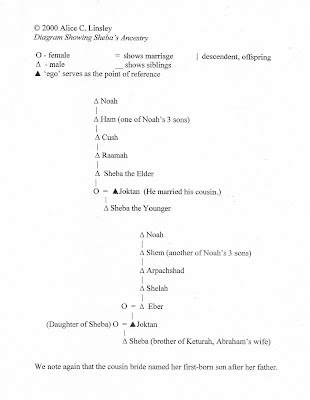
Alice C. Linsley
Analysis of the geneological information in Genesis 4 and 5 reveals that the lines of Cain and Seth intermarried. The lines of Ham and Shem also intermarried according to the same pattern. This is evident from analysis of the ancestry of Sheba the Elder and his grandson, Sheba the Younger.
At the top of the diagram, we see that Sheba, the Elder, Noah's descendent through Ham, had a daughter who married Joktan and named her first-born son Sheba after her father. This is typical of the patrilineal cousin brides among the Horite rulers of Abraham's people.
At the bottom of the diagram, we see that Joktan, Eber's son, married a daughter of Sheba the Elder. As Joktan's patrilineal cousin bride, she named their first-born son Sheba after her father. This pattern is found in Genesis 4 and 5 also. Namaah, Lamech's daughter, married her patrilineal parallel cousin Methuselah, and named their first-born son Lamech after her father.
 |
| Old Arabic script dating to 600 BC |
CLICK on diagram to enlarge.
The clans of Sheba (Sabaea) are close relatives of the Jokanite clans of South Arabia. The territory of Sheba is referred to 24 times in the Hebrew Bible. Beer-sheba, Keturah's home, was at the northern end of the territory of Sheba.
An inscription (shown) confirms trade between towns in Judah and Sheba. It dates to about 600 B.C. and is written in the distinctive South Arabian script by a messenger of the King of Sheba.
The kingdom of Sheba was also famous for breeding exellent horses (See Robert Morkot's The Black Pharaohs).
The kingdom of Sheba was also famous for breeding exellent horses (See Robert Morkot's The Black Pharaohs).


.jpg)









2 comments:
Do you know, "JustGenesis"? - I have told you this before, but somehow you blaze a trail with every new thing you come up with, and your work is generally the only logical-seeming conclusion to things that I see regarding such topics as "Abraham", and/or "the Horites", ad infinitum! You are amazing! I refine and refine my thought processes (searchs), and I have ended up here so many times it's ridiculous!
Having established that: I have never gotten past thinking that "eber" (ibri or ivri in Hebrew<->English) + "ham" (cham in English<->Hebrew - I read the interlinear Masoretic and other texts - alot); whatever, what I thought it might mean is exactly what landed me here on this site just now - they intermarried! Now, I'll admit, my dyslexic/autistic brain will NEVER allow me to follow the "marrying your half-sister and first-cousin thing", but I can still be dazzled by the fact that you CAN follow it, and you figured it out for people like me who will always remain at least one step behind you. :)
All these myriad names like "habiru", "eber", "ibri", "Hebrew". I think I've satisfied at least myself that "Ab" or "Ib" is "father", not "Abra" or "Ibri". And that Abra + Ham is the "father of many nations" is an acceptable, logical-sounding and convenient solution for some people who accept things at 'face value' (of course which I rarely do!). But, yes, Abraham 'married' a daughter of Ham, specifically of Mizrayim (Egypt, "Hagar"), and later married "Keturah", another daughter of Ham, specifically of "Canaan". And they all had kids. And since 'Abraham' is variously referred to as Syrian (even, I've seen, as "the King of Damascus", after the 5 vs 4 Kings war (his manservant was Syrian too - the guy who went to find Rebekah), and "Ur of the Chaldees" is more probably "Urfa". See, e.g.,
http://turkishtravelblog.com/sanliurfa-urfa-city-of-abraham/. If you factor in that the cradle of civilization is Goebekli Tepe in Turkey (near Syria), and that so many unbelievable events and places are all really close to each other (many, if not most, in modern-day Turkey, but hey - who's quibbling?). Why was is that Abraham, and then Isaac (and Jacob) married Syrian cousins/half-sisters, and yet, it wasn't a problem for Abraham to marry to Hamites? It saddens me that people are still fighting the same wars in the same places that saw war 3-4 thousand years ago. With their cousins!
I will always be a believer (in God, just one of my own imagining, no particular one; He's mine; and He helps me with stuff like finding my car keys, but no - He never talks to me. Voices in the head..... I won't say it, b/c many ppl with voices in their head are revered by millions.....so... But I love biblical historicity and history and the Book(s)themselves, and the more I explore, the deeper the mystery of God and the Universe gets. My very devout brother always tells me, "Don't learn too much", but of course, that is impossible. Thx again, Just Genesis. We somehow think very much alike in many things. :) Ken, in PA.
Ken,
I have posted three articles recently on the historicity of biblical persons and events. I think you would be interested in these.
The Historical Adam
https://jandyongenesis.blogspot.com/2017/08/the-historical-adam.html
On the historicity of Noah's flood
http://jandyongenesis.blogspot.com/2017/07/the-historicity-of-noahs-flood.html
Evidence for the Exodus
http://biblicalanthropology.blogspot.com/2017/05/anthropological-evidence-for-exodus.html
Best wishes!
Alice (Jandy)
Post a Comment